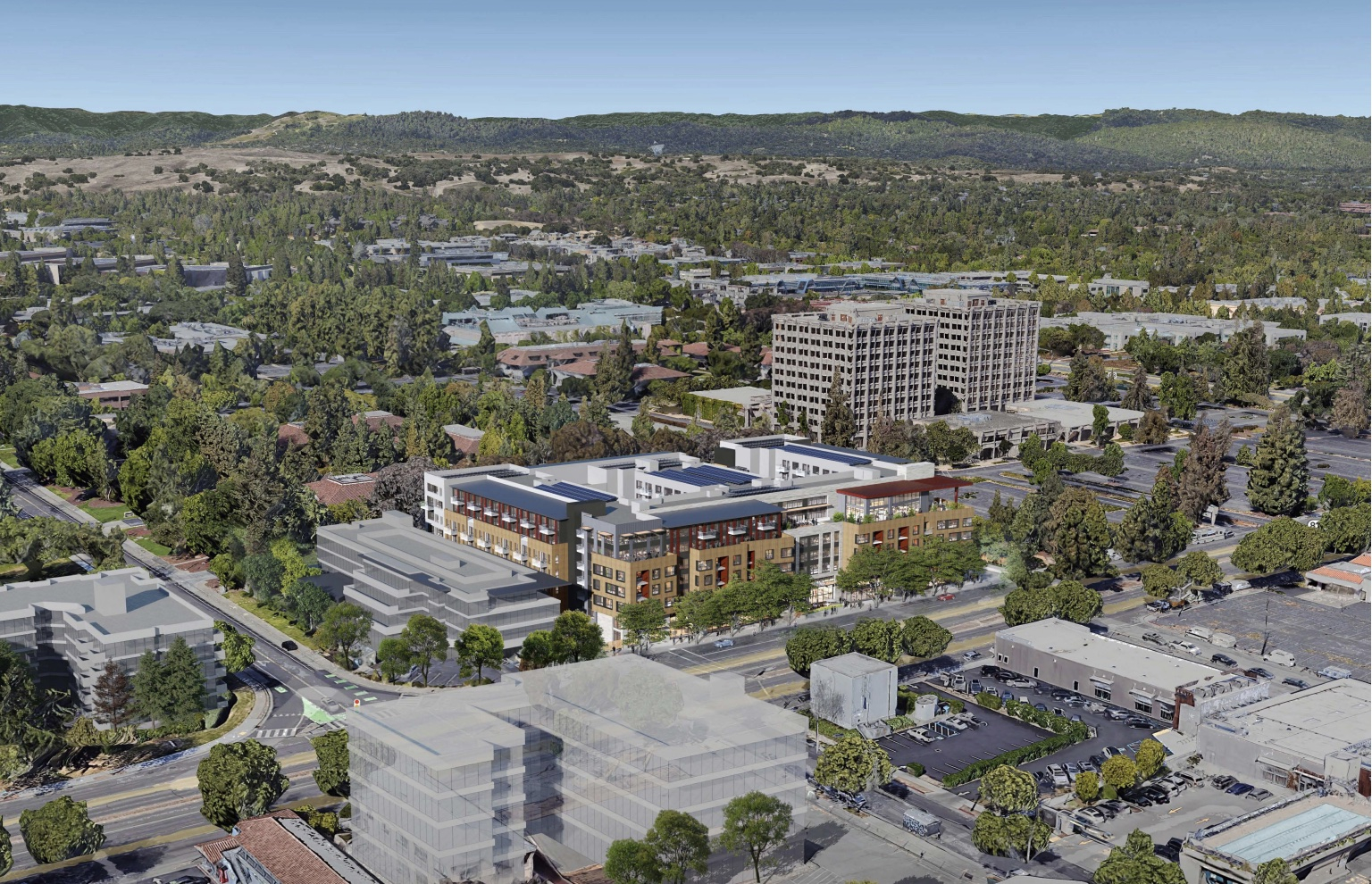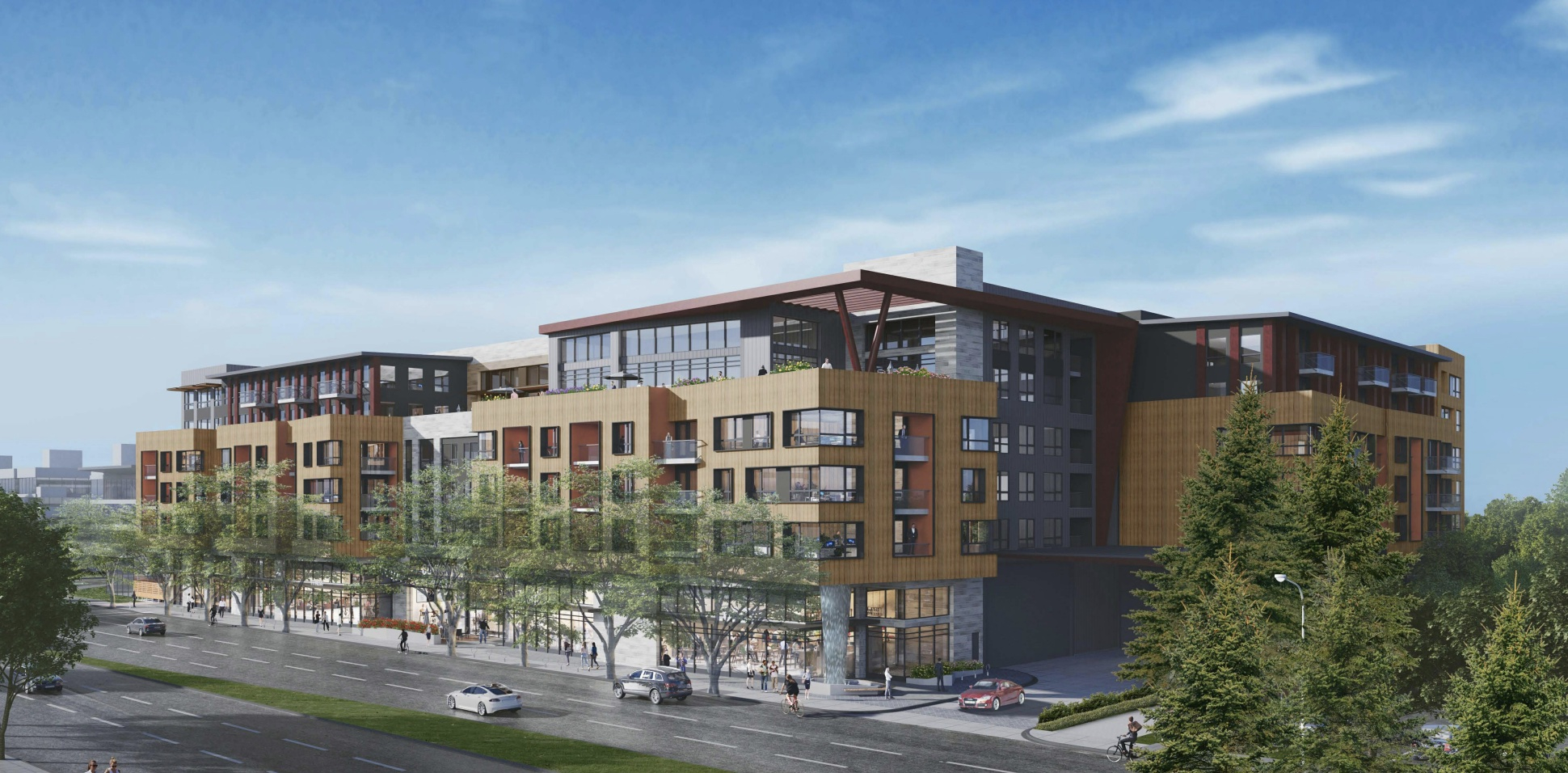A developer looking to demolish The Fish Market restaurant in Palo Alto and build a 380-apartment complex is preparing to invoke the state's "builder's remedy" law to overcome the city's objections to the project.
The proposal from Acclaim Companies would be seven stories tall with a height of 84 feet, well above the city's 50-foot height limit, according to project plans. It would also have a two-story underground garage with 477 spaces.
Acclaim filed an initial application to construct the housing development in June. In order to gain approval of the project's height and density and to expedite the process, the developer leaned on two state housing laws. One is the state's Density Bonus Law, which allows residential builders to claim more height and density and to get exceptions to various development standards. The other is Senate Bill 330, which creates a streamlined approval process for housing projects and bans cities from changing design rules once an application is submitted.
While the initial application is still being vetted, Acclaim's submission on Wednesday, Aug. 2, of a new application indicates that the developer is preparing to take a more aggressive approach toward its project at 3150 El Camino Real.
California's "builder's remedy" provision, which applies to cities that do not have a certified Housing Element, allows developers to advance projects that exceed local zoning regulations. Even though the Palo Alto City Council voted to approve the city's Housing Element in May, the document has yet to be certified by the state Department of Housing and Community Development, which is now reviewing the city's second draft and is scheduled to issue its verdict later this month.
Acclaim's new application is just the latest Palo Alto development proposal to invoke the previously untested provision, which has become increasingly common across the state this year. In April, Roger Fields became the first developer to rely on the builder's remedy law in Palo Alto when he invoked it for a 45-condominium development at 400 Lambert Ave.
A development team of Juno Realty Partners and Far Western Land and Investment Company followed suit in June with an application that banks on builder's remedy to advance its 350-apartment project at 3997 Fabian Way.
And last month, developer Oxford Capital submitted a builder's remedy application for its project at the site of the Creekside Inn in the Barron Park neighborhood, a development that was heavily criticized by neighbors and council members when it was first proposed under a more conventional zoning process. The new project includes 185 apartments, a renovation of three hotel buildings with 63 rooms and a new hotel building with 137 rooms.
The Creekside Inn project would be located at 3400 El Camino Real, one block south of the proposed Acclaim development, in an area that developers are attempting to transform into a major hub of residential construction.
Across the street from those two developments, the city is moving ahead with a 129-apartment complex for low-income residents, spearheaded by Charities Housing, and an adjacent 16-condominium project pitched by Dividend Homes at 420 Acacia Ave. (Neither the Charities nor Dividend projects have invoked the builder's remedy.)
Palo Alto's neighbors Los Altos Hills and Menlo Park have also received ambitious proposals invoking the builder's remedy provision. This includes a 300-foot-tall mixed-use development that the company N17 is pursuing in Menlo Park at 80 Willow Road, former headquarters of Sunset Magazine.
The Aug. 2 Acclaim proposal is now the largest builder's remedy project under reviewed by Palo Alto. The building would be on a 2.55-acre site just south of the Palo Alto Square business complex that includes a McDonald's restaurant as well as The Fish Market.
The proposed housing complex would include an interior courtyard with a swimming pool and a clubroom, project plans show. Along the El Camino Real frontage, the developer is looking to establish a leasing office, co-working space, a fitness area and a "bike café."
The one major difference between Acclaim's original proposal and the new one is the number of apartments designated for affordable housing. In keeping with requirements for builder's remedy projects, the developer is now preparing to designate 20% of the dwellings in the new development — or 76 apartments — as below-market-rate units.
In a letter to the city, Acclaim's attorneys Tamsen Plume and Genna Yarkin of the firm Holland & Knight indicated that the new proposal is an alternative to the one that the developer had proposed in June and that is being reviewed by city planners.
The attorneys cited a letter they had received from the city asserting that the initial project is not permitted at its proposed density even with use of the state's Density Bonus Law. The attorneys said they are now reviewing the city's letter and that they are planning to discuss it with the city attorney's office.
"Given the uncertainty about City support for the Project as proposed and in order to safeguard its ability to construct an economically feasible project, Acclaim hereby submits a preliminary SB 330 application for a 'Builder's Remedy Alternative,' without abandoning its pending application for the Project or any of its arguments about its ability to pursue such Project under State Density Bonus Law," the attorneys wrote.
Plume and Yarkin also noted that because of 20% of the apartments in the new application are reserved for low-income units, it qualifies for builder's remedy. And because the city "lacks a substantially compliant Housing Element, the Builder’s Remedy Alternative need not comply with General Plan or zoning standards," they wrote.




Comments